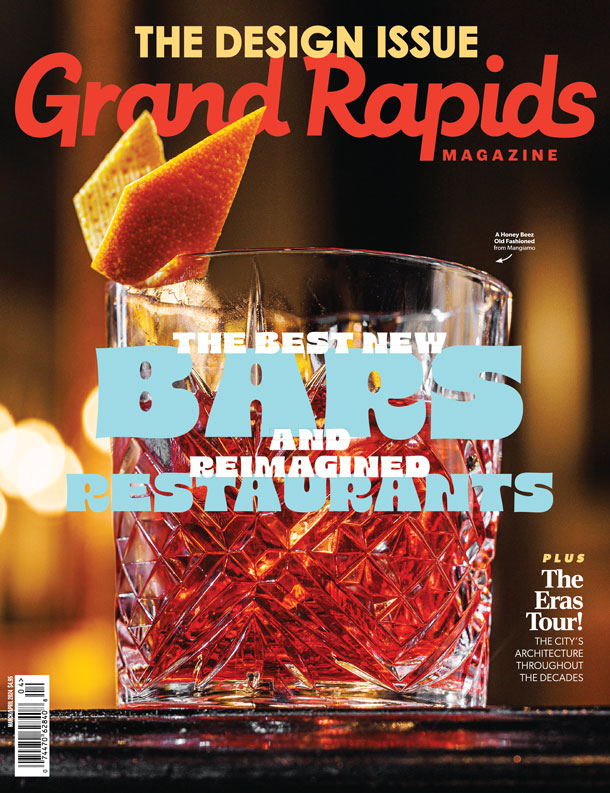This article is from the March 2019 Grand Rapids Magazine. Available on newsstands now or via subscription.
Anyone who has worked as a bartender will tell you that March 17 (and often a day on either side of it) is an abject nightmare. A cultural holiday that’s turned into a chaotic bar crawl, demoting the evening’s potables to sheer quantity over quality, and lowering expectations of both guests and bar staff to nearly animalistic. If you can’t tell by the sour prose, I’ve definitely bartended my fair share of St. Patrick’s Days.
The worst crime, however, is ignoring the fact that Irish whiskey actually makes for some really lovely cocktails and can be mixed in a way that does honor to the products, rather than disguises them for mass consumption.
Irish whiskey is its own subclass of spirit, as bourbon whiskey, Scotch whisky, Canadian whisky, etc. (notice the alternating “e” spelling — the usually correct mnemonic is that if the country has an “e” in the name, the whiskey has an “e” in the word). While the strictness of rules governing each title vary (bourbon doesn’t have to be made in Kentucky, but Scotch does have to be made in Scotland), what’s most important for us, the everyday cocktail hobbyists, is to recognize expected styles of the spirits.
Irish whiskey is made from barley, generally distilled three times, making for a lighter spirit. Using a bit of unmalted barley in traditional Irish whiskey also keeps a flavor profile that’s crisper, more grassy, citrusy and floral. Aging for Irish whiskey is usually less dependent on heavy oak usage, resulting in a lighter-tasting, more grain-focused flavor profile.
With these notes in mind, we can cross-reference them against the flavor profiles of our usual whiskies (bourbon is sweeter, more caramel/vanilla; rye is fruitier and spicier; Scotch is usually earthier and smokier; etc.), and against favorite whiskey cocktails, and start experimenting with adjustments that suit the profile of our seasonal specialty.
Take, for instance, the Manhattan. An ageless classic made simply with two parts rye whiskey and 1 part sweet vermouth, plus a dash of spicy angostura bitters. The cocktail works because of the shared flavors: Rye is spicy and fruity, the vermouth is fruity and bitter, the angostura is bitter and spicy — it’s like a Venn diagram.
Now, trade in a light, crisp Irish whiskey, with notes of lemon peel, toasted oat and honey. It’s drier and less rich, but more perfumed than rye. So, instead of sweet vermouth, we’ll reach for Lillet Blanc, an aromatized wine (made almost exactly like vermouth) with a lighter flavor and more lemony, peachy, floral notes. Swap the angostura bitters for peach bitters, finish with a twist of lemon, and you’ve got a really pretty Irish counterpart to a classic Manhattan — in a way that celebrates the Irish whiskey.
This technique is exactly how to play with your favorite cocktails or new ingredients, considering their structure/components and then retrofitting your recipes to become your own new twist. Try it with some of your other go-to spirits and see what other Irish whiskey inspirations you can discover — a julep with lemon verbena? An apricot whiskey sour? Oat milk eggnog?
Celebrate St. Patrick’s this year with mixology; you’ll discover some great new recipes.
— Torrence R. O’Haire, of The Starving Artist, is a chef, entrepreneur and restaurant consultant specializing in wine, spirits and cocktails. He also founded the Grand Rapids Cocktail Guild.
Recipe
One recipe to get you moving, based off a classic French 75:
The Snake Chaser
1½ ounces Powers Irish whiskey
¾ ounce fresh lemon juice
¾ ounce pineapple juice
¾ ounce honey syrup (1 part honey dissolved into 1 part water)
½ teaspoon Matcha green tea powder
3 ounces (approx.) prosecco
Combine all ingredients except prosecco in an ice-filled cocktail shaker. Shake well until mixing tin is frosted. Strain into a flute glass and top with prosecco. Garnish with a pineapple leaf and a lemon twist.








Facebook Comments